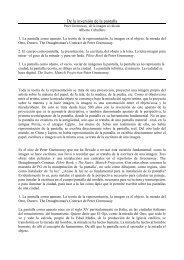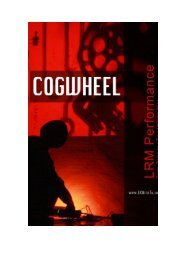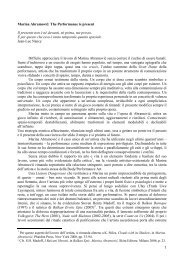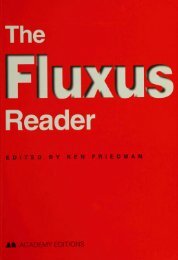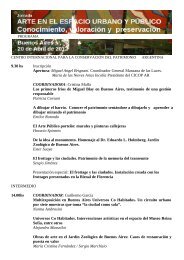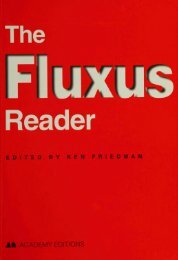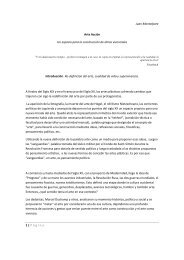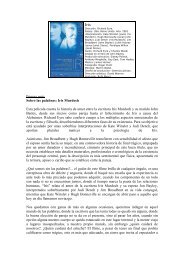#.». ACADEMY EDIT I - Geifco.org
#.». ACADEMY EDIT I - Geifco.org
#.». ACADEMY EDIT I - Geifco.org
Create successful ePaper yourself
Turn your PDF publications into a flip-book with our unique Google optimized e-Paper software.
x<br />
KEN FRIEDMAN<br />
appropriately subtle understanding of Fluxus leaves open the question of what it may still do.<br />
That's good enough for me.<br />
Owen Smith and I were discussing this book one afternoon. We reached the conclusion<br />
that it is as much a beginning as a summation. If, as Ge<strong>org</strong>e Brecht said in the 1980s, 'Fluxus<br />
has Fluxed', one can equally well say what someone - Dick? Emmett? - said a few years later:<br />
Fluxus has not yet begun.' There is an on-line discussion group called Fluxlist where the<br />
question of what lies between those two points has been the subject of much recent dialogue.<br />
One of the interesting aspects of the conversation has been the philosophical subtlety<br />
underlying the several positions. Those who believe there is a Fluxus of ideas and attitudes<br />
more than of objects feel that there is, indeed, a future Fluxus. This Fluxus intersects with<br />
and moves beyond the Fluxus of artefacts and objects. This vision of Fluxus distinguishes<br />
between a specific Fluxus of specific artists acting in time and space and what Rene Block<br />
termed 'Fluxism', an idea exemplified in the work and action of the historic Fluxus artists.<br />
Beginning or summation, this book offers a broad view of Fluxus. It is a corrective to the<br />
hard-edged and ill-informed debates on Fluxus that diminish what we set out to do by<br />
locating us in a mythic moment of time that never really existed. Fluxus was created to<br />
transcend the boundaries of the art world, to shape a discourse of our own. A debate that<br />
ends Fluxus with the death of Ge<strong>org</strong>e Maciunas is a debate that diminishes Ge<strong>org</strong>e's idea of<br />
Fluxus as an ongoing social practice. It also diminishes the rest of us, leaving many of the<br />
original Fluxus artists disenfranchised and alienated from the body of work to which they<br />
gave birth. In the moments that people attempt to victimise us with false boundaries, I am<br />
drawn to two moments in history.<br />
The first moment occurred in sixth-century Chinese Zen. It reflects the debates around<br />
Fluxus in an oddly apt way, and not merely because Fluxus is often compared with Zen. It<br />
involved the alleged split between the Northern and Southern schools of Zen. The real facts<br />
of the split seem not to have involved the two masters who succeeded the Sixth Patriarch, one<br />
in the North and one in the South, Shen-hsiu and Hui-neng. The long and tangled stories of<br />
schism seem rooted, rather, in the actions of Hui-neng's disciple Shen-hui and those who<br />
followed him. It has little to do with the main protagonists who respected and admired each<br />
other to the point that the supposedly jealous patriarch Shen-hsiu in fact recommended Huineng<br />
to the imperial court where he, himself, was already held in high renown. This is like<br />
much of the argument around Fluxus. It seems that the protagonists of one view or another,<br />
the adherents of one kind of work or another, those who need to establish a monetary value<br />
for one body of objects or another, seem to feel the need to do so by discounting, discrediting<br />
or disenfranchising everyone else. That makes no sense in a laboratory, let alone a laboratory<br />
of ideas and social practice.<br />
The other moment 1 consider took place a few years ago, when Marcel Duchamp declared<br />
that the true artist of the future would go underground. To the degree that Fluxus is a body<br />
of ideas and practices, we are visible and we remain so. To the degree that Fluxus is or may<br />
be an art form, it may well have gone underground already. If this is true, who can possibly<br />
say that Fluxus is or isn't dead? We don't know 'whodunit', we don't know who does it and<br />
we certainly don't know who may do it in the future.<br />
Ken Friedman



